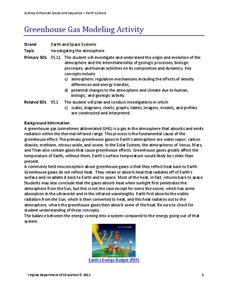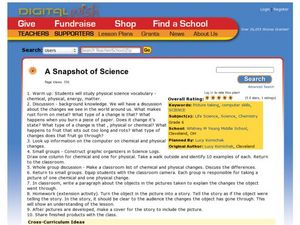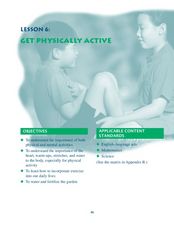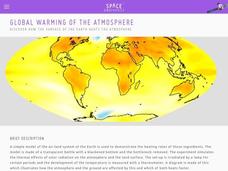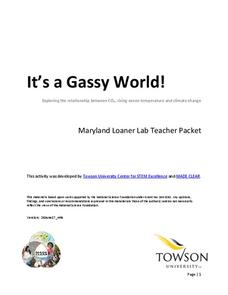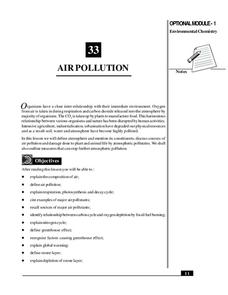Agency for Toxic Substances and Disease Registry
Don't Mess with Mercury (Lesson A)
Mercury is the only metal that is a liquid at room temperature. Teach your class this and many more interesting mercury facts by assigning an engaging task. A public relations activity, the exercise informs pupils of the hazards of...
Virginia Department of Education
Greenhouse Gas Modeling Activity
Why are greenhouse gases called greenhouse gases? Young Earth scientists learn about greenhouse gases though experimentation in the second installment of a 3-part series. They use lamps to model radiant energy as well as warming through...
Pearson
The Skeletal and Muscular Systems
Introduce future doctors to medical terminology and phrases associated with the skeletal and muscular systems. As they work through a series of worksheets and exercises, high schoolers apply their knowledge of the bones of the human body...
Space Awareness
Oceans as a Heat Reservoir
Oceans absorb half of the carbon dioxide and 80 percent of the greenhouse gases released into the atmosphere. Scholars learn how and why the oceans store heat more effectively than land and how they help mitigate global warming. Pupils...
Curated OER
A Snapshot of Science
Sixth graders explore physical and chemical changes. In this physical science lesson, 6th graders study vocabulary, discuss the changes they see in the world and look up information on chemical and physical changes. Students create...
Curated OER
Get Physically Active
Students discover the importance of water. In this physical education science instructional activity, students consider mental and physical activities. Students find their pulse and measure their heart rate. Students discuss the...
Discovery Education
By All Indications
How do people determine if something is acidic or basic? Learners make their own acid-base indicators using red cabbage and then determine the acidity and alkalinity of different substances. First, they test substances of known pH and...
Curated OER
AP Biology Daily Lesson Plans Curriculum
Searching for exciting lesson plans filled with hands-on activities to use in your traditional classroom environment? Look no further! This set of lesson plans for AP Biology covers topics from genetics to evolution, botany to ecology,...
Academy of American Poets
Teach This Poem: "In the Next Galaxy" by Ruth Stone
Imagine what life might be like in a different galaxy. That's the challenge young scientists take on in a warm-up activity designed to prepare them for a close reading of Ruth Stone's poem "In the Next Galaxy." After class members share...
Curated OER
The Day After Tomorrow: How is the Density of Water Related to Climate Change and Global Warming?
Science learners simulate what happens when ice breaks up and floats on water and how increased pressure on ice causes it to melt faster. They view a clip from the movie, The Day After Tomorrow, and relate their lab activities to what...
Center Science Education
Investigating the Climate
What do graphs of atmospheric gases over time show us? Do they indicate that carbon sources and carbon sinks are not in balance? Up-and-coming meteorologists watch video clips, read information, and analyze data from the HIPPO (HIAPER...
Curated OER
Changing Planet: Adaptation of Species (Birds and Butterflies)
A video about the impact of climate change on butterfly populations and a PowerPoint about butterfly and bird adaptations warm science learners up for the activity to follow. Using a variety of tools that reprsent unique styles of bird...
Curated OER
Short and Sweet Science
Readers learn how to summarize scientific text and evaluate the advantages, disadvantages, and challenges in writing summaries. They select science-related articles you've pulled and collected from the New York Times and, with a partner,...
Curated OER
Gas Pressure, Volume, and Temperature
Physical science learners conduct a simple experiment using the heat of their hands to affect the fluid pressure. They place a balloon atop a freezing cold bottle and observe what occurs as it warms up. Both activities demonstrate how...
Space Awareness
Global Warming of the Atmosphere
Scientists know the amount of carbon dioxide in the atmosphere today is higher than at any point in the last 800,000 years. Scholars learn about the amount of thermic radiation absorbed by air and what happens to the rest of the...
Wild BC
Greenhouse Gas Line-Up
Discuss different sources of energy and how much greenhouse gas each might emit. The six sources are then ranked according to emissions from greatest to least. Finally, the true cumulative emissions are revealed to show the class how...
University of Minnesota
Homeostasis of Thermoregulation
Whether you're battling the flu or trying to warm up on a chilly day, your body's ability to react to temperature change is fascinating! Anatomy scholars discover the fantastic feedback loops that control body temperature in a rigorous...
Curated OER
Centripetal Force
In order to investigate cetntripetal force and angular momentum, youngsters compare the motion of erasers hung from a string. It is not clear what type of Amish toy is needed in the warm up activity, so you may not be able to use it. The...
Curated OER
Math Club Warm-Ups
In this math warm-up activity, students complete a warm up activity, copying know diagrams. Problem is printed 4 per page for copying purposes.
Will Steger Foundation
The Carbon Cycle - What are its Implications for Climate Policy?
The carbon cycle isn't a bike which produces carbon and this lesson explains why. Through reading and discussion, groups of pupils create visual explanations of the four parts of the carbon dioxide oxygen cycle. Activities...
Towson University
It's a Gassy World!
How much does your class know about the relationship between climate change and carbon dioxide? Science scholars explore the nature of greenhouse gases and rising ocean temperature through demonstrations, research, and experiments. The...
Agency for Toxic Substances and Disease Registry
Don't Mess with Mercury (Lesson B)
At one point, people thought mercury was therapeutic for humans, but now we know it is highly toxic. The second of three activities covering mercury focuses on its health hazards if humans are exposed. Pairs research and answer questions...
National Institute of Open Schooling
Air Pollution
Seventy percent of the air pollution in China is due to car exhaust. Under the umbrella of environmental chemistry, learners extensively explore air pollution. From the makeup of our atmosphere to sources of major air pollutants, classes...
Illustrative Mathematics
Toilet Roll
Potty humor is always a big hit with the school-age crowd, and potty algebra takes this topic to a whole new level. Here the class develops a model that connects the dimensions (radii, paper thickness, and length of paper) of a common...



